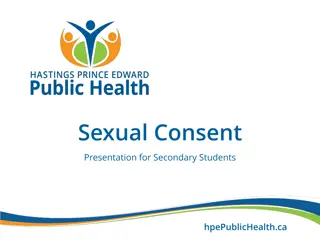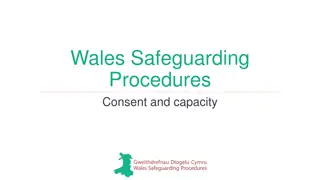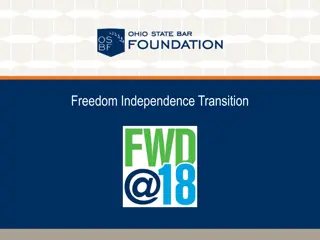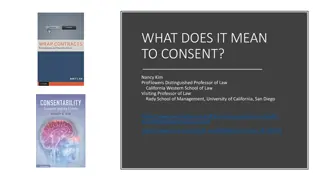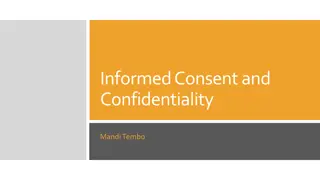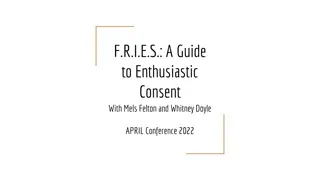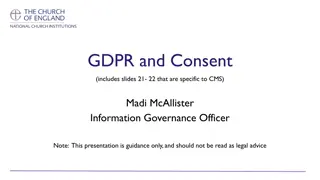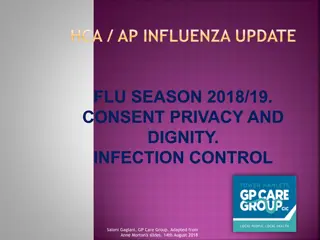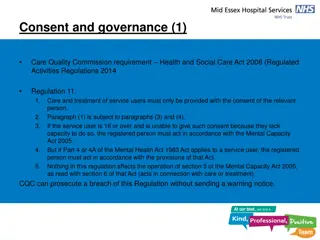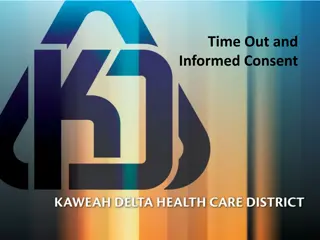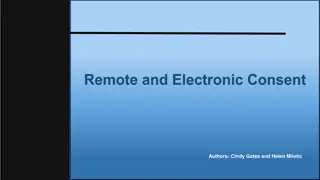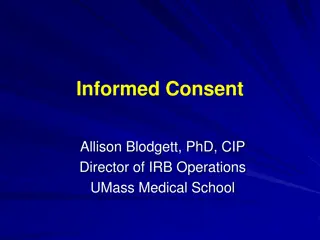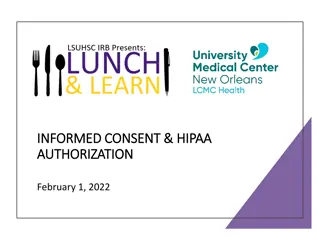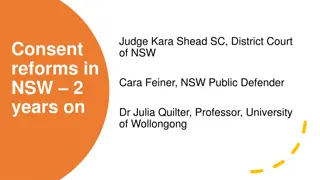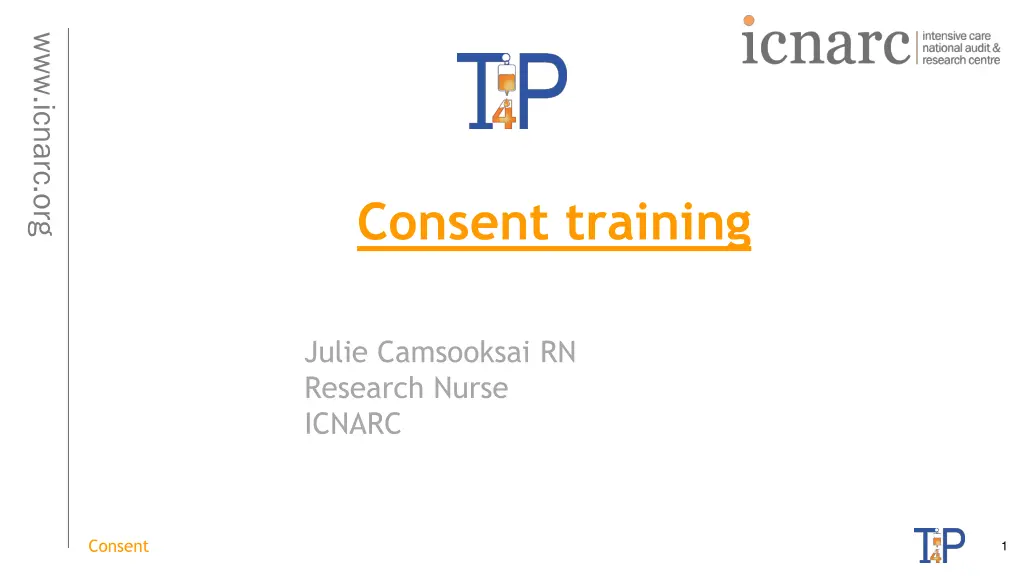
Key Points on Deferred Consent Model in Emergency Research
Explore the deferred consent model within emergency and critical care research, allowing recruitment before consent in situations where time is critical. Learn about the importance, ethics, and process of obtaining consent in these scenarios.
Download Presentation

Please find below an Image/Link to download the presentation.
The content on the website is provided AS IS for your information and personal use only. It may not be sold, licensed, or shared on other websites without obtaining consent from the author. If you encounter any issues during the download, it is possible that the publisher has removed the file from their server.
You are allowed to download the files provided on this website for personal or commercial use, subject to the condition that they are used lawfully. All files are the property of their respective owners.
The content on the website is provided AS IS for your information and personal use only. It may not be sold, licensed, or shared on other websites without obtaining consent from the author.
E N D
Presentation Transcript
www.icnarc.org Consent training Julie Camsooksai RN Research Nurse ICNARC Consent 1
Deferred consent model / Research Without Prior Consent www.icnarc.org Key points Recruit patient into trial before consent Acknowledged acceptable method of consent HRA & REC approved This protects patients and you Designed for use in trials where patients are likely to lack capacity and time is important - delaying would impact care and trial Used in critical care & emergency research Discussion of generic principles then specific to T4P Consent 2
Deferred consent model / Research Without Prior Consent www.icnarc.org This is an accepted consent model in adult emergency and critical care research where participants are likely to lack capacity and minimises the distress and burden on families. Developed and approved following work with patients & PPI groups general principle of RWPC and specifically for T4P Consent 3
www.icnarc.org Ensures vulnerable group are not excluded from opportunities to participate in research HRA: Emergency research is when treatment needs to be given urgently, and it is necessary to take urgent action for the purposes of the study HRA: Adults who are not able to consent for themselves should be included in research, provided that you do this in line with relevant legal frameworks and ethical principles . Consent 4
www.icnarc.org NIHR: Emergency Research Guidance issued by the HRA Consideration whether or not the trial is a CTIMP (T4P is not) In some emergency situations potential participants may lack capacity to give consent themselves Obtaining consent from a legal representative / consulting others may not be reasonably practicable. Consent 5
www.icnarc.org Consent 6
www.icnarc.org Capacity Consider what patient capacity is relevant to: Patients eligible for T4P are likely to lack capacity to undertake a fully informed decision on whether to participate in clinical trial within the required timeframe (ie so not to delay their treatment) Consent 7
www.icnarc.org NIHR: Establishing Capacity . 1 A person is Competent (able to make a decision for themselves) if they are able to: understand information relevant to the decision retain the information use or weigh the information communicate their decision (by any means) Consent 8
www.icnarc.org NIHR: Establishing Capacity .2 Capacity may depend on type of decision (assess for each particular decision - don t assume!) Incapacity may be temporary or fluctuate Presumption of capacity (MCA 2005) Researchers must be able to assess capacity when recruiting participants - or seek expert advice - DOCUMENT this! With deferred consent, assess capacity when approaching for retrospective consent. Consent 9
www.icnarc.org NIHR: Adults lacking capacity Voluntary consent is a fundamental principle underpinning the ethical conduct of all clinical research When a person is unable to volunteer for themselves it is essential that their presumed will informs any decisions made on their behalf would they volunteer to participate if they were unable to make the decision for themselves ? There are different processes in place to support and record decision making for CTIMPs and non-CTIMPs, though representation of the potential participant's presumed will is at the heart of both Consent 10
T4P: Patient flow www.icnarc.org Screening Randomisation Safety monitoring Platelet transfusion threshold: Data collection <10x109/L <20x109/L <30x109/L <40x109/L <50x109/L Consent Follow-up Consent 11
Deferred consent model / Research Without Prior Consent Patients likely to lack capacity at time of randomisation Emergency waiver of consent granted by REC (Mental Capacity Act) www.icnarc.org After randomisation - once patient s medical situation is considered no longer an emergency, the consent procedures should begin o Consent sought after randomisation by GCP-trained delegated team member o Expected to be within 24-48 hours of randomisation : should be considered, not strict timeline See T4P Study Manual section 6 Consent 12
See T4P Study Manual section 6 Consent procedures www.icnarc.org In situation where patient has capacity: seek verbal/other non-written consent to randomise if appropriate, (document) otherwise consent is deferred Patient confirmed eligible In the situation where a Personal Consultee is available, in person, at the time the patient becomes eligible for inclusion, and if deemed appropriate, the Personal Consultee can be presented with an Information Leaflet. If no objection to patients participation, they are randomised and deferred consent process followed Consent 13
See T4P Study Manual section 6 Consent procedures www.icnarc.org Once medical situation is no longer an emergency (around 24-48 hours after randomisation) Approach patient for consent Patient confirmed eligible Approach Personal Consultee for opinion (in person/telephone) If patient lacks capacity Randomisation Approach Nominated Consultee for opinion Seek verbal/ other non-written consent, if appropriate Consent 14
See T4P Study Manual section 6 Personal Consultee opinion If patient lacks capacity, approach Personal Consultee o Relative/close friend - not restricted to next of kin Consultee advises on patient s likely wishes/feelings regarding participation in the trial Approach: o In person (preferred) Give Patient Information Sheet (PIS) with Personal Consultee PIS Cover Sheet attached and use Personal Consultee Opinion Form o Postal (if unable to visit) Offer to send PIS and Personal Consultee PIS Cover Sheet via post Personal Consultee completes Postal Personal Consultee Opinion Form and returns in pre-paid envelope o Telephone (if unable to visit) Offer to send PIS and Personal Consultee PIS Cover Sheet via email or post Complete Remote Personal Consultee Opinion Form over the phone Must be witnessed www.icnarc.org Consent 15
See T4P Study Manual section 6 Nominated Consultee opinion Approach Nominated Consultee if: o Patient lacks capacity and no personal consultee is available, i.e.:- there is no personal consultee, or they are not contactable / visiting, or they lack capacity, or they don t want to act as consultee o Patient has died www.icnarc.org Nominated Consultee can include: o Appropriately qualified clinician independent of the trial (not on Delegation/Training Log) o Independent Mental Capacity Advocate Purpose o To advise on patient s likely wishes/feelings regarding participating in the trial o To reduce stress on grieving relatives Consent 16
Nominated Consultee opinion www.icnarc.org Do not need a Nominated Consultee opinion prior to randomisation Do not need to get a Nominated Consultee opinion before a Personal Consultee If you do receive Nominated Consultee opinion & later find there is a Personal Consultee, and the patient still lacks capacity, you should approach the Personal Consultee. Consent 17
If patient dies prior to consent If approach has already been made to family: o Go back to them to check agreement. o No requirement for them to sign opinion form. o Ask Nominated Consultee to sign opinion form. o Document all discussions www.icnarc.org See T4P Consent Guide If approach has not already been made to family: o Inform family of patient s involvement in trial as routine procedure (good practice / duty of candour) o Ask Nominated Consultee to sign consent form. o Document all discussions Consent 18
See T4P Study Manual section 6 Patient informed consent Upon recovery, patient should be approached directly o Give Patient Information Sheet (Deferred) o Approach with Consent Form (Deferred) Explain consent options www.icnarc.org If patient wishes to have more time or is discharged, approach by telephone/post after discharge o Complete Remote Consent Form (Telephone) or send Postal Consent Form o Telephone consent must be witnessed Patient s decision is final Consent 19
Explaining the trial Information should be clear, concise and not medicalised Explain: o Why we are doing the trial o Why consent cannot be sought in emergency situations o Explain platelet transfusions and the allocated thresholds in easy to understand terms o Note that all thresholds are within usual care across the UK the trial is about finding out which is best www.icnarc.org See T4P Consent Guide Allow time to think about the trial, discuss with friends/family and ask questions Trial consent guide provided to sites for support Consent 20
Completion of consent/opinion forms Signing indicates agreement with points 1-5 www.icnarc.org Points 6-8 (follow up, receiving trial results and future research) should be initialled to indicate Yes or No Optional but should be encouraged o Patient/consultee completes first, then person seeking consent checks form is completed correctly and countersigns in their presence If patient unable to physically sign the form, an independent witness may sign on their behalf A copy given to the patient/consultee, a copy for medical notes and original stored in ISF Consent 21
See T4P Study Manual section 6 Consent procedures Please make sure you use the correct information sheet and consent/opinion form Documents: www.icnarc.org Personal consultee opinion In person Patient Information Sheet Deferred Personal Consultee PIS Cover Sheet Personal Consultee Opinion Form By post Patient Information Sheet Deferred Personal Consultee PIS Cover Sheet Personal Consultee Enrolment Covering Letter Personal Consultee Opinion Form Postal By telephone Patient Information Sheet Deferred Personal Consultee PIS Cover Sheet Personal Consultee Opinion Form Remote (Telephone) o Prospective patient consent In person only Patient Information Sheet Prospective Consent Form Prospective o Deferred patient consent In person Patient Information Sheet Deferred Consent Form Deferred By post Patient Information Sheet Deferred Patient Enrolment Covering Letter Consent Form Postal By telephone Patient Information Sheet Deferred Consent Form Remote (Telephone) o Nominated consultee opinion In person Patient Information Sheet Deferred Nominated Consultee PIS Cover Sheet Nominated Consultee Opinion Form o Consent 22
See T4P Study Manual section 6 Refusals and Withdrawals If patient/consultee declines (refuses) or withdraws consent, clarify which aspects they are declining/withdrawing from o Total vs. partial - may be willing to allow continued data collection (must be documented) o Not obliged to provide a reason www.icnarc.org Data on events occurring up to refusal/withdrawal retained in trial, unless patient/consultee requests otherwise o Data entry on MACRO should be completed up until point of refusal, i.e., up until 16:00 on Observations Day [2] if refusal/withdrawal occurred at 16:00 on Obs Day [2] Consent 23
Completing eCRF (MACRO) : Consent Consultee opinion o Enter all details following approach o If a consultee is never approached, select consultee approached? NO www.icnarc.org Patient consent o Enter all details following approach o If a consultee agrees, then a patient refuses, this is a refusal not a withdraw all data entered on consent page If a nominated consultee is approached and then a personal consultee is approached (NB this should not happen) o Complete details of opinion from the nominated consultee. Save. o Then update the page by completing the personal consultee opinion details overrides the nom consultee information add a comment. We can see as audit trail. Consent 24
Withdrawal Withdrawal is when favourable opinion or consent has been given and then, later, withdrawn by the same person. www.icnarc.org e.g. A consultee provided favourable opinion and has signed the opinion form. Later, the same consultee changed their mind and withdrew this for any or all of the opinion options. e.g. A patient provided consent, has signed the consent form. Later, the patient changed their mind and then withdrew this for any or all of the consent options. Completing eCRF (MACRO) : Complete withdrawal of consent page Consent 25
Documentation of consent Document all consent approaches in the patient s medical records. www.icnarc.org Including: assessment of mental capacity details of discussions that agreement to continued trial participation was provided. detail if there is agreement to some aspects of the trial and not others, refusal, including any reasons if given. incidences of non-approach or delay in approach, with rationale. Consent 26
National Data Opt-out (NDOO) NHS service that allows patients in England to opt out of their confidential information being used for research and planning. www.icnarc.org T4P trial recruitment prior to consent is approved - includes patients who may have a NDOO. You do not need to check for a NDOO prior to screening & randomisation. Consent overrides NDOO including consultee opinion. If you discover that a patient recruited into T4P has a NDOO and approach for opinion/consent has not yet been made, still approach for opinion/consent the patient or consultee can decide whether they agree to trial participation and this will override the NDOO. Consent 27
Trial resources www.icnarc.org Consent guide T4P CRF Guidance Consent 28
Recommended training: www.icnarc.org NIHR valid informed consent course (half day) NIHR Informed Consent with Adults Lacking Capacity course (on line) Both via NIHR learn: https://learn.nihr.ac.uk/ Recommended reading: ENHANCE: Guidance to inform communication with bereaved families about their relatives' participation in emergency or critical care research without prior informed consent. August 2024 ENHANCE,Guidance_Version,1.0,Aug,2024.pdf (liverpool.ac.uk) Consent 29
Next steps www.icnarc.org If you would like a certificate for this consent training, please email T4P@icnarc.org with your full name, designation and site/hospital. Consent 30
Thank you Any questions? www.icnarc.org T4P@icnarc.org 020 7831 6878 Icnarc.org/Our-Research/Studies/T4P Consent 31



